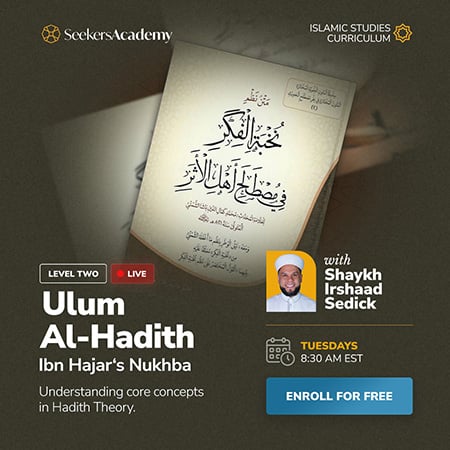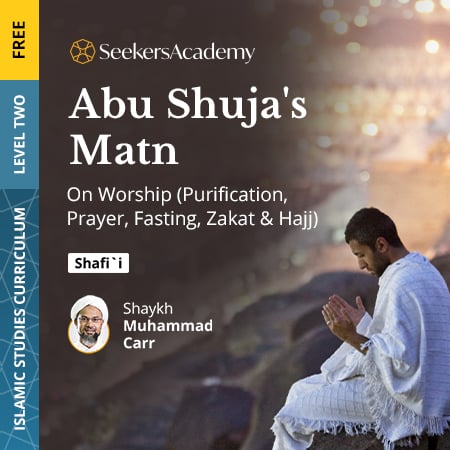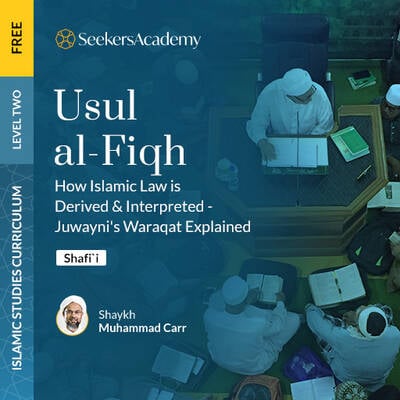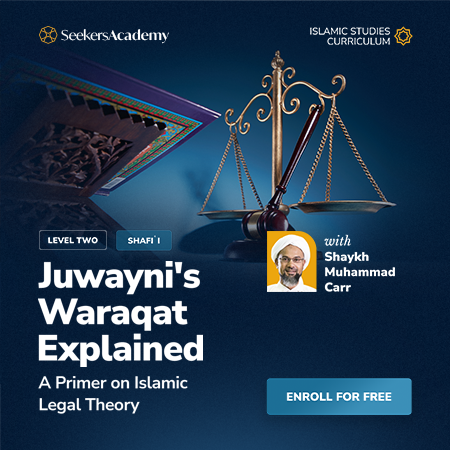
This course thoroughly studies one of the most studied manuals on the Principles of Hadith and its nomenclature written by one of the most influential Hadith scholars of all time - Nukhbat al-Fikar by Imam Ibn Hajar al-Asqalani (Allah have mercy on him) (852 AH). The text is usually studied after the completion of al-Bayquniyyh, and it is considered the gateway for studying the upper-intermediate and advanced textbooks of Hadith sciences. It is also considered the key to understanding the methodology of the scholars of Hadith from the 8th and 9th centuries onward because most of the scholars of Hadith after Ibn Hajar followed his systematic approach.
By carefully examining the definitions of Hadith principles and nomenclature included in the Nukhba, students can conceptualize the criteria and application of Hadith authentication. The course will also provide a thorough introduction that covers the epistemological underpinnings of Hadith as a reliable source of knowledge, the intellectual history of Hadith sciences, and the tradition of teaching Nukhbat al-Fikar.
While maintaining focused attention on conveying the objectives of the Nukhba as intended by its author, the course will briefly touch upon the key variations between the early and the late schools of Hadith as well as the significant differences between the methodologies of Ahl al-Hadith and the Hanafis.
- Teacher: Mawlana Irshaad Sedick
Delve into the heart of Hadith sciences with ‘Nukhbat al-Fikar,’ a cornerstone work penned by the distinguished Ibn Hajar al-Asqalani (may Allah have mercy on him), a titan in the study of Hadith. Since its inception, this seminal text has marked a pivotal moment in the scholarly pursuit of Islamic traditions, representing the first canonical framework for understanding the principles of Hadith.
But what makes ‘Nukhbat al-Fikar’ so revolutionary? Beyond its concise distillation of prior works, its true innovation lies in its logical organization and systematic approach to Hadith sciences and terminology, establishing it as the inaugural “matn” (a foundational text) dedicated to the principles of Hadith.
Upon its completion, ‘Nukhbat al-Fikar’ quickly garnered acclaim from Ibn Hajar’s mentors and disciples, establishing a legacy of scholarship. The text’s profound impact is further evidenced by the swift emergence of commentaries, beginning with those from Ibn Hajar's teachers and then his expansive elucidation, ‘Nuzhat al-Nazar.’ This dialogue between ‘Nukhbat al-Fikar,’ its commentaries, and super-commentaries has enriched Islamic scholarship, creating a vibrant study tradition around the text.
Today, ‘Nukhbat al-Fikar’ is not just a work of historical significance; it is a living part of the curriculum in Islamic studies across madrasas and institutes worldwide. Its continued relevance and the tradition of scholarship it inspired are a testament to Ibn Hajar al-Asqalani’s unparalleled contribution to Islamic sciences. Engage with ‘Nukhbat al-Fikar’ and connect with a rich legacy of scholarly inquiry that continues to illuminate the path for students of Hadith across the globe.
This course is meticulously designed for adult learners eager to deepen their understanding and mastery of Hadith sciences. It is classified as a Level Two course, indicating that it builds upon foundational knowledge that participants are expected to have before enrollment.
Ideal participants for this course include
Individuals who have completed foundational courses, specifically "An Introduction to the Science of Hadith: Bayquni's Hadith Terminology" and "Abhari’s Isaghuji: An Introduction to Traditional Logic". These courses lay the groundwork necessary for a comprehensive understanding of the material covered in this more advanced course.
Learners with a keen interest in the intricacies of Hadith authentication processes, including the rigorous requirements that Hadith must meet to be considered authentic.
Those who wish to explore the methodology of verifying the credibility of Hadith narrators, an essential aspect of Islamic scholarship.
Participants eager to understand the dynamics of Hadith transmission, including the evaluation of chains of narration, which is crucial for assessing the authenticity and reliability of Hadith.
In summary, this course is ideally suited for individuals dedicated to advancing their expertise in Hadith sciences, particularly emphasising the authentication process, narrator verification, and understanding the complexities of Hadith transmission. It promises to be an enriching experience for anyone committed to delving deeper into the study of Hadith.
- Grasp the epistemological underpinnings of the Sunna, recognizing its role and reliability as a vital source of Islamic knowledge.
- Acquire the ability to discern and interpret Hadith terminology, appreciating the contextual nuances embedded within.
- Gain a comprehensive understanding of the Hadith authentication process, including its rigorous requirements.
- Master the methods used to verify the credibility of Hadith narrators.
- Develop a deep understanding of the various disciplines within Hadith sciences and their significance in the authentication process.
- Learn to categorize Hadith based on their degrees of acceptance or rejection, enhancing their critical evaluation skills.
- Understand the intricacies involved in the transmission and assessment of Hadith chains of narration, facilitating a nuanced appreciation of Hadith reliability.


